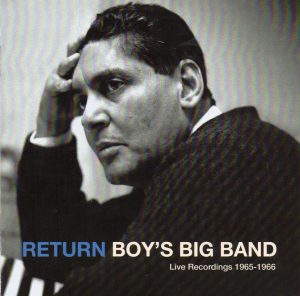Boy Edgar was the most famous big band leader of his time, but at the same time a busy doctor and an alcoholic. A biography on this ADHD'ing all-rounder was published for the first time. An impressive, sometimes disconcerting book marred only occasionally by factual inaccuracies.
By day, he was, among other things, a renowned neurologist, a revolutionary abortionist and the first general practitioner in the Bijlmermeer. By night, he was a jazz pianist and trumpeter, composer and arranger and, above all, the leader of a big band in which the best young and old jazz musicians in the Netherlands worked together. And at the same time, he was also a big drink taker and a womaniser.
The recently published biography of Boy Edgar (1915 - 1980) bears the subtitle 'The double life of an all-rounder'. But that term 'double life' already seems inadequate; actually, he lived three, four lives at once. He died at 65, utterly burnt out.
It is possible to write a spectacular biography about such a person, and journalists Marie-Claire Melzer and Marieke Klomp have done just that. It has turned out to be an exciting book, which fortunately does not cover up with the cloak of love that the glory days of Edgar's big band were short-lived; the decline of the orchestra, founded in 1960, began back in the early 1970s.
Musicians stayed away as Edgar's arrangements were increasingly limited to some messily notated bars. Commissions from broadcasters therefore also became scarce. His appointment at a scientific institute was terminated as he rarely showed up there. Booze sometimes seemed Edgar's only faithful ally.
What Edgar sounded like at his best can be heard on a brand new CD of previously unreleased live recordings: Return (Nederlands Jazz Archief). On it, Boy's Big Band pulls out all the stops in the mid-1960s. Edgar displays atmospheric sounds á la Duke Ellington, but also collaborates with the young dogs of the time, including Theo Loevendie. The wild jazz cats are kept nicely in check by disciplined studio musicians, while under Edgar the latter group is for once confronted with adventurous material. Almost everyone plays at the top of their game.
The authors write: ''He chased the sprout air out of Dutch jazz by not caring about the tribal struggle between beboppers and avant-gardists. He simply worked with everyone he thought was good.''
The biography describes a life that lends itself to a feature film. Born and died in Amsterdam, Edgar grew up the son of a stone-rich Armenian father who lost everything after the 1929 stock market crash. He partly paid for his studies as an unskilled but extremely musical jazz trumpeter. He is still remembered as a resistance fighter who continually risked his life for the benefit of Jewish absconders during World War II. He earned his PhD on the causes of multiple sclerosis, the disease his first wife succumbed to.
In the 1960s, he was among the first to secure public funding for a jazz orchestra. He succeeded thanks to his unbridled charm, charisma and energy. ''Almost all the interviewees started beaming as soon as they started talking about Boy Edgar,'' the authors write.
The only shortcoming of this biography concerns a relatively modest amount of factual inaccuracies. While the authors have thoroughly immersed themselves in Edgar's life - with valuable support from daughter Jane Edgar - they are not all-round jazz experts. We read here, for instance, that reviewer Mike Zwerin 'rarely wrote about European jazz', even though he was pre-eminently a journalist who wrote about it. The Diamond Five would 'only play their own pieces', when in reality the band had all the popular hardbop hits in its repertoire. Chet Baker was said to be a typical representative of hard bop. History doesn't let itself be rewritten that easily.
But these are details in a book that makes it tempting to play amateur psychologist. After all, what drove the equally restless and gifted Edgar? It seems he sought oblivion in a multitude of activities after a confusing childhood. A kind of insecurity may also underlie this: if he felt he was being criticised for his work as a physician, he could always fall back on his musical reputation - and vice versa.
To quote the authors again: ''Officially he died of a liver ailment but you could say he became torn between everything and everyone.''
[bol_product_links block_id=”bol_5acfaae8abe9a_selected-products” products=”9200000035871289,9200000035881183″ name="boyedgar" sub_id=""" link_color="003399″ subtitle_color="000000″ pricetype_color="000000″ price_color="CC3300″ deliverytime_color="009900″ background_color="FFFFFF" border_colour="D2D2D2″ width="590″ cols="2″ show_bol_logo="0″ show_price="1″ show_rating="1″ show_deliverytime="1″ link_target="1″ image_size="1″ admin_preview="1″]CD: Boy's Big Band: Return (Netherlands Jazz Archive).

